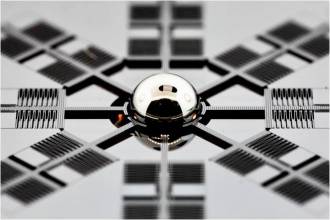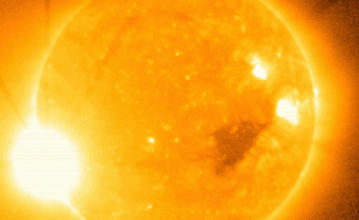Russia is showing ever-stronger signs of a serious intention of not merely restoring its GNSS system, GLONASS, but of turning it into a true dual-use system with a presence in civil and commercial markets.
Russia is showing ever-stronger signs of a serious intention of not merely restoring its GNSS system, GLONASS, but of turning it into a true dual-use system with a presence in civil and commercial markets.
Addition of CDMA (code division multiple access) signals to the Russian system’s transmissions — or possibly even conversion of GLONASS’s frequency division multiple access (FDMA) signals to CDMA — appears increasingly likely. Such a move would simplify interoperability with the GPS and Galileo systems and associated user equipment.
Sergey Revnivykh, deputy director of the Mission Control Center of the Russian Federal Space Agency (Roscosmos) raised that a possibility in a presentation last September (see “360 Degrees” news item in October 2006 issue of Inside GNSS). It was reaffirmed December 14 in a joint statement issued by a U.S.-Russia working group on GPS and GLONASS.
“Both sides noted that concerning the question of the use [of] FDMA and CDMA significant progress was made in understanding the benefit to the user community of using a common approach. The Russian side noted that a decision in this regard would be made by the end of 2007.” On December 25, Russia launched another three GLONASS-M satellites, which broadcast open signals on both L1 and L2 frequencies near to GPS and Galileo transmissions. A third open GLONASS signal may be placed near Galileo’s E5B band beginning with the first launch of next-generation GLONASS-K satellites later this year.
The new flight of spacecraft went into GLONASS Plane II, which had been devoid of operational satellites. According to the Roscosmos Information-Analytical Center (IAC), 19 operational satellites are in orbit. However, as of mid-January, the IAC website indicated that seven of these were “temporarily switched off.” The trio of new GLONASS-M, still in the commissioning phase, also were not transmitting yet. Roscosmos and military officials are working to restore the constellation to 18 operational satellites by the end of this year and 24, by 2009.
At the beginning of 2007 the Russian Ministry of Defense carried through on its promise to remove restrictions on civil use of positioning data obtained from GLONASS. Previously, the accuracy of geospatial coordinates that could be legally obtained and used was limited to 30 meters.
In its report on the lifting of restrictions, the Itar-Tass news agency quoted Russian Defense Minister Sergei Ivanov as saying that GLONASS “will not be effective without commercial profit, without the implementation; it is needed for military purposes, but this is not all.” In his statement to Itar-Tass, Ivanov said, “This [removal of restrictions] allows making open topographic and navigation maps of a large scale, allows using equipment of the space navigation system on a legal basis, and allows the citizens and the economy to receive and use materials from aerospace means regardless of a resolution.”
Russian agencies currently are working to complete 1/100,000-scale digital topographical maps for the nation, which would support development of advanced navigation systems that could be used in Russia.
A major conference and exhibition, the International Satellite Navigation Forum 2007, is being organized in Moscow April 9–10 in association with Roscosmos with a focus on commercial products and applications (see the news article in Industry View in this issue of Inside GNSS). The December 14 U.S.-Russian working group statement noted that the forum “will be a unique opportunity to demonstrate the benefits of GLONASS and GPS interoperability in the Russian Federation for civil applications.”
All these developments are consistent with a Russian government directive issued April 19, 2006, to encourage a “renovation” of the Russian GNSS receiver manufacturing industry to support development of mass markets.
Copyright 2007 Gibbons Media and Research LLC





